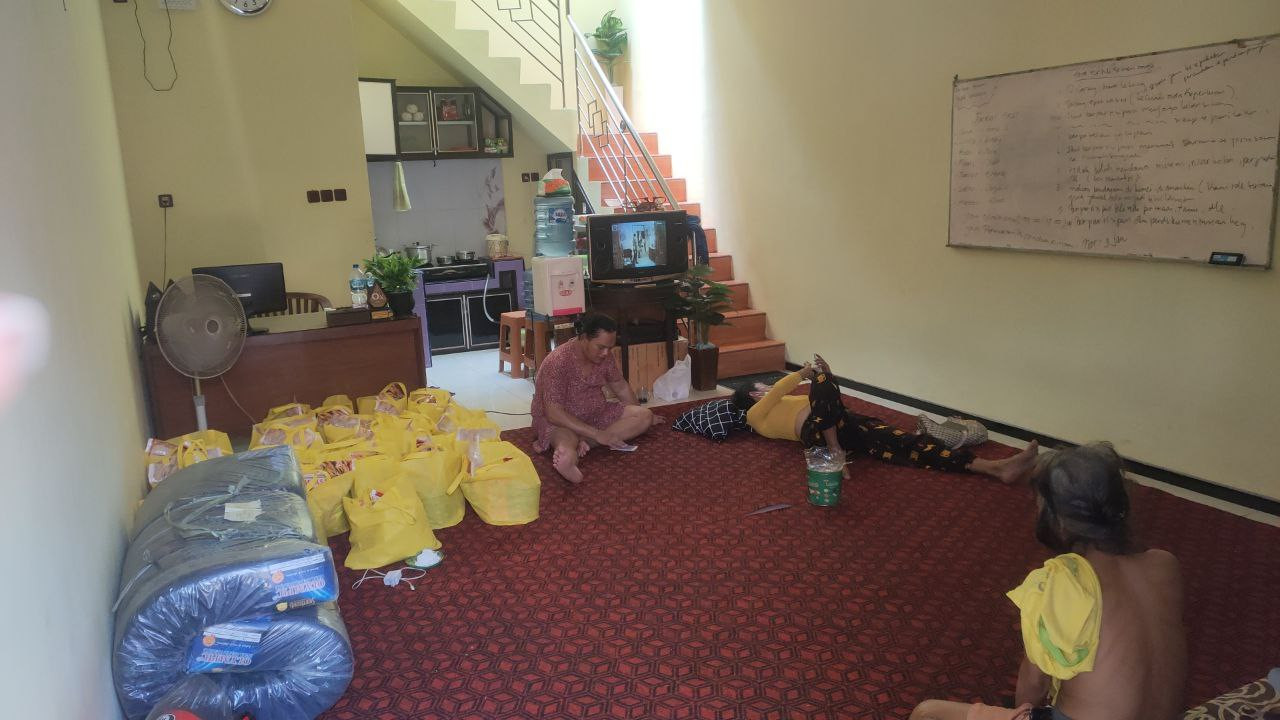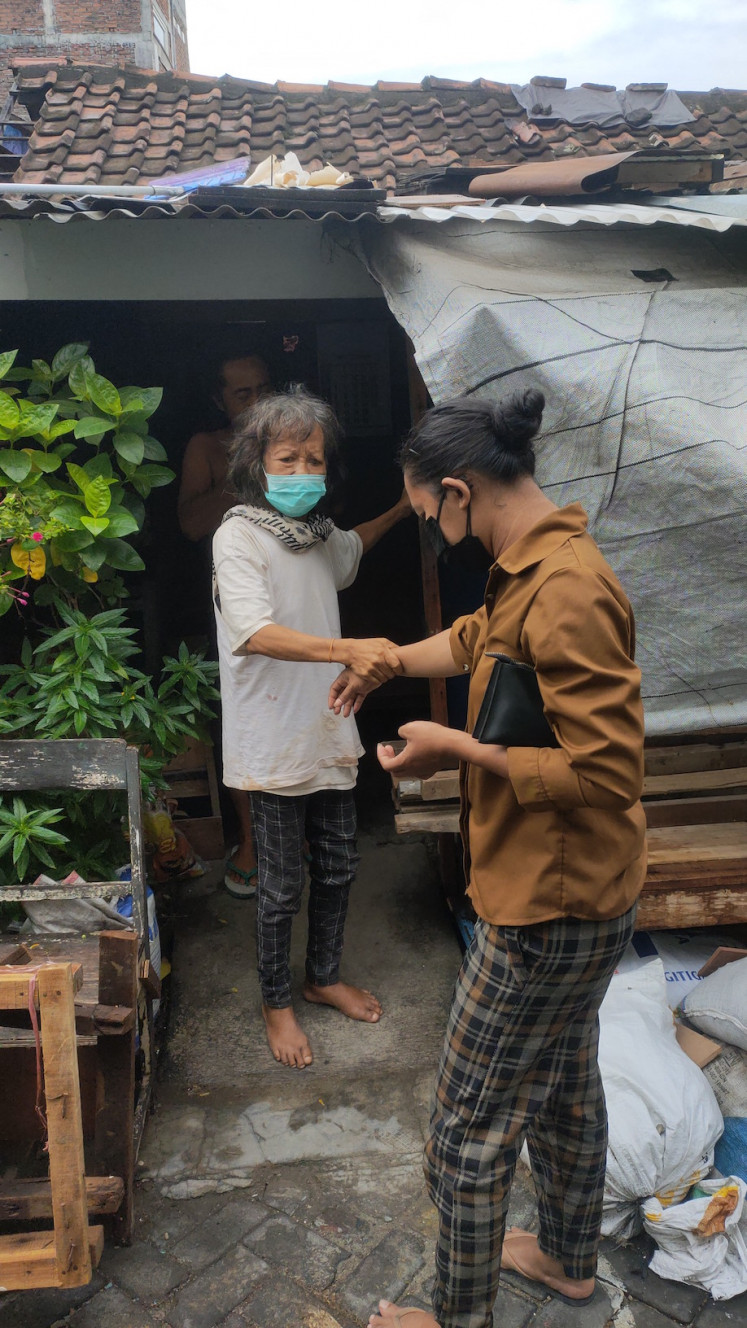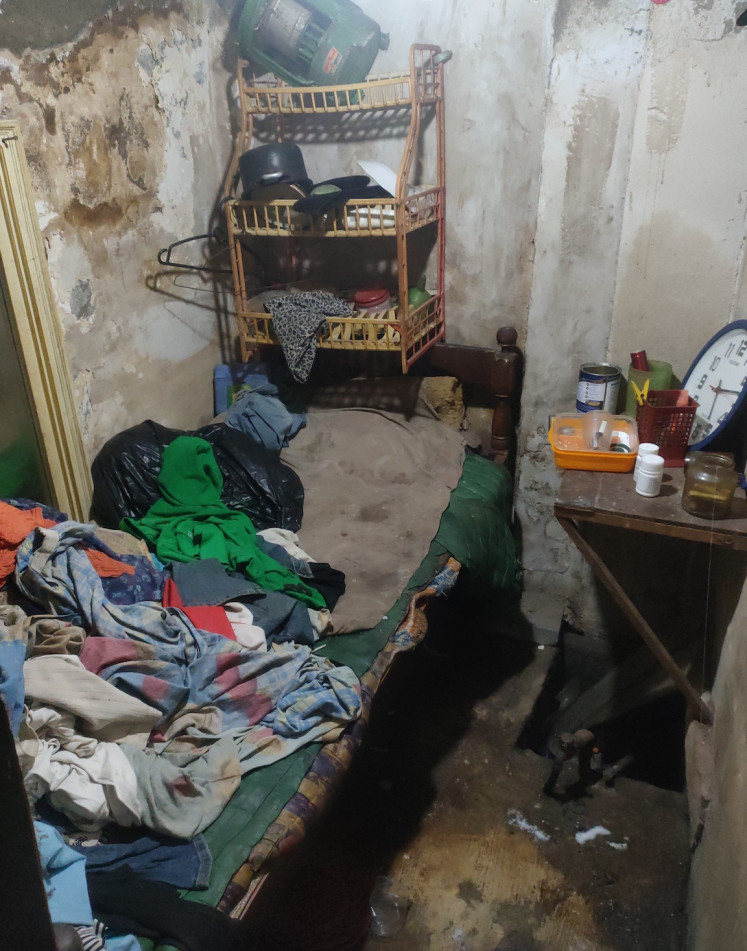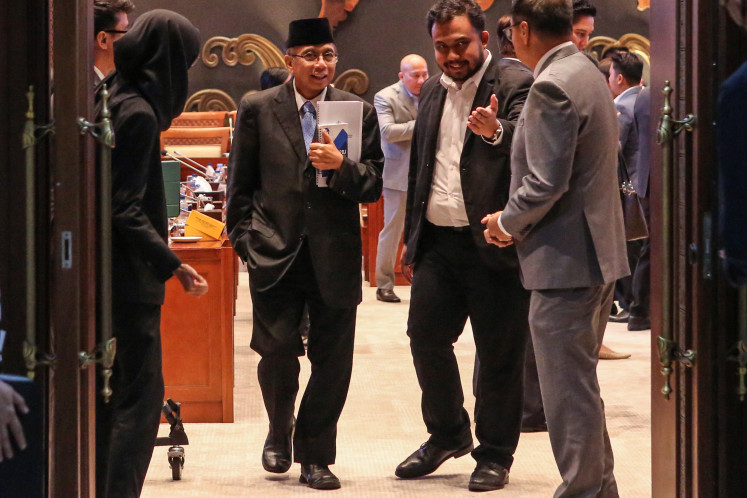Popular Reads
Top Results
Can't find what you're looking for?
View all search resultsPopular Reads
Top Results
Can't find what you're looking for?
View all search resultsLifting lives: Perwakos' elderly home offers haven for trans women
Change text size
Gift Premium Articles
to Anyone
The plight of elderly trans women is often neglected, but Perwakos aims to change this with its community-run home.
When they found Kajad, the elderly trans woman was living a life of squalor in the slums of Surabaya, East Java.
“She’s ill, can barely walk and her family had abandoned her completely. She needed medicine and a proper place to recover,” said Febby Damayanti, a trans community activist.
Something had to be done, or Kajad would simply disappear into the city’s underbelly like many other transgender people.
The needs of Indonesia’s senior trans people are unfortunately being sidelined amid the more vocal narratives on the country’s many challenges and issues. But Kajad’s story is far from uncommon. Just like members of the greater transgender community, senior trans people face discrimination, neglect and abandonment, and financial uncertainty at every turn.
As trans people become older, more frail and unable to work, they find that there is no social safety net or protection in place for them.
Persatuan Waria Kota Surabaya (Coalition of Surabaya trans organizations), or Perwakos, means to change this.
Perwakos was formed when a nongovernmental organization that focused on trans health and rights banded together with like-minded NGOs to establish an elderly home for trans people in Surabaya. Located in a modest, two-story house in Tambaksari, North Surabaya, the facility provides senior trans people with health care, support and a safe place to stay and recover.
Of course, the journey of Perwakos’ new initiative isn’t straight, as it faces an apathetic local administration, hostile neighbors and a trans community on the verge of giving up.
Raising support
Febby’s decade-long career as a field officer and her own experience as a trans woman has given her a unique insight to the issues of trans women in Surabaya. But even a community organizer as experienced as her found the incidences of last October not a little shocking.
“We received reports on eight trans women who were severely ill,” she recalled.
“Four of the [trans women] were seniors, two were HIV-positive. They had been abandoned. Their families couldn’t support them, their neighbors wouldn’t help them. As a community, we felt a responsibility to help [them].”
Tragically, one of the senior trans women passed away shortly afterward.
“When she died, she had no identity documents and her family wouldn’t help provide them,” Febby said. “So, the local authorities wanted to bury her anonymously as ‘John Doe’. They prepared a grave for her that was too shallow and narrow. It was simply inhumane.”
Febby collected donations from members of the trans community and other supporters and bought a small cemetery plot to bury her properly.
But the experience made it clear that whatever social safety nets had been available to trans people, whether formal or informal, had simply evaporated during the pandemic. Already marginalized, they are now living perilously close to the edge.
“Over 80 percent of trans women are sex workers,” said Irma, an activist who sits on the Perwakos advisory board and has worked with Surabaya’s trans community for almost two decades.
“The job market isn’t open to us to do anything else, it’s closed by either the state or [society]. Offices, private and government alike, accept male and female applicants, but they don’t consider trans people. So when we’re young, the easiest thing to do is sell our bodies,” she said.
Sex work is a means of making a living that doesn’t require higher education, another privilege that is not afforded to trans people in Indonesia.
“But what happens when they get older, their energy is gone and they can’t do physical activities like they used to? The trans community doesn’t have the habit of saving money and preparing for old age. So they become beggars, buskers or scavengers,” said Irma.
Trans people’s standard of living also drops precariously the older they become.
“Perwakos once assisted a trans woman called Mbak Merry who lived well below what could be considered humane,” said Anindya Sabrina, another community activist in Surabaya, referring to Merry by the Indonesian honorific for older women.
“She was living in a rented room for Rp 25,000 [US$1.74] a month,” Anindya explained, where the tenants had to set up a makeshift toilet to use.
Through fundraising efforts, Merry was able to move to better lodgings and open a small shop, but her story is emblematic of the struggles of the wider community of senior trans women.
“Younger trans women can work. It’s dangerous work and it’s not ideal at all, but at least they have a means of making money,” Irma said. “Older trans people are often just forgotten.”
A major problem is that many trans people are undocumented, hampering their access to public services like health care and financial aid.
“Our friends in the community have a history of stigmatization and discrimination from their own family. They ran away from home so they could claim their [trans] identity,” said Febby. “They don’t have a [good] relationship with their families.”
Family identity cards are required to apply for an individual ID card, which is issued by the regional administration.
Irma said that some public offices even required a photograph taken with the applicant’s relatives who lived in the area as “proof of residence”. Such requirements were nearly impossible for most trans women to meet, considering that many had fled home and cut all ties to their families, or had been disowned.
“Most of us feel it’s better to be independent, even though we have no official identities,” Febby said.
A lifetime of run-ins with corrupt officials, ingrained social discrimination and violence because of their gender identity meant that the trans community had very little trust in the system, Irma explained.
“We’re discriminated against and face violence, even death, but there’s no real investigation or consequences for the perpetrators,” she said. “It becomes a struggle to convince trans people that they are people with rights and privileges, just like anyone else.”
Most trans people, according to Irma’s description, could be said to spend a significant portion of their lives as second-class citizens. They exist, but are not formally registered; they are visible, but neglected.
When they age and need public services like health care and housing, they encounter a system that is seemingly designed to shut them out. With no identity cards and no means of obtaining them due to social and cultural discrimination, they end up falling by society’s wayside.
“Trans women get kicked out of their homes, are cut off from their families and have no one to take care of them when they’re sick,” said Anindya.
“An HIV-positive trans woman named Mbak Sofi, for example, was cast off completely by her family when her mother passed away. When she got sick, some trans friends took care of her,” she said, adding that Sofi eventually died of her illness.
“Homes for trans people are a primary need,” Anindya stressed.
Squalor: The room where Ibu Kajad, their first visitor, lived before moving to Perwakos' shelter (Courtesy of Febby Damayanti) (Personal collection/Courtesy of Febby Damayanti)Trans homes
After collecting online donations late last year through its Instagram account, @perwakos, the organization had enough funds to rent a modest house in Tambaksari, and used whatever was left to buy supplies of food and medicine. Perwakos is still raising funds to cover the second year’s rent and expand its services to residents at the home.
“We want to provide shelter to [our] severely ill friends facing stigmatization and discrimination,” said Irma.
“It’s important to give [them] a sense of safety. Their nutritional needs are met, they have a proper place to rest with proper sanitation and air circulation. It’s a humane place for them to stay, at least temporarily, until they get better.”
The home is not fully operational yet. The second floor is still empty, as Perwakos is still sourcing medicine, beds and other items. Eventually, it plans to accommodate at least 10 residents and provide them with counseling, medical support and proper meals.
Kajad, the elderly trans woman who was living in the slums, is the home’s first resident. Perwakos expects to host many more elderly trans people in the near future.
“We’re currently negotiating with several hospitals and clinics to provide healthcare services for trans women at our shelter,” Irma explained.
“For the long term, we want to set up a scheme through which we can teach [residents] new skills and provide assistance so they can be more financially independent in the future. Even if it’s just selling [goods] from kiosks and small shops, it would mean a lot for their security.”
However, Perwakos is also realistic.
“We’re currently looking for embalming experts to teach trans people how to take care of our friends who have passed away,” Irma said.
“There are too many stories of difficulties getting [burial services] for trans women,” she said, so the options were to either teach the residents or for Perwakos members to provide the service themselves.












